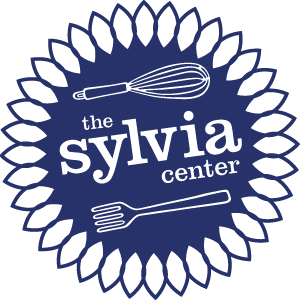Why Nutrition Education Matters
Meet The Sylvia Center’s Director of Programs, Corey King
Interviewed by Cindy Hu, Digital Content Coordinator
Why is nutrition education important to you? What inspired you to become an advocate for health and wellness through nutrition?
Nutrition education is important to me for so many reasons. It is my firm belief that nutrition education allows students to have a better understanding of how their bodies’ work and gives them more control over their own health. Nutrition education can (and should) also address the policies, inequities, and other big picture food justice topics that influence our food system. Engaging, hands-on nutrition education can have a major impact on the future health of young people and their own communities.
I’m an advocate for this work with children and teens because I have seen first hand the need when it comes to adults. I began my career as a dietitian working in a hospital. I encountered many patients with chronic illnesses associated with poor diet. I met many patients who, after a nutrition counseling session, would say to me, “I wish I had learned about this when I was younger”. Through these experiences I became interested in the current state of nutrition education for our young people here in New York City and wanted to get involved. I became a part-time nutrition educator in a culinary based program in after school while still working at the hospital. I fell in love with this style of preventative work and the skills and joy it brings to students and families who participate in it. It is my hope that there will be fewer incidences of diet associated illnesses in the future. I believe this must start with fun, engaging nutrition education that is coupled with access to healthy foods for all young people.
What are the changes you have seen in youth development from young people learning how to cook with fresh ingredients?
Beyond health, I have been fortunate to see many of the benefits meaningful nutrition education. Young people develop self-reliance, interpersonal skills, and confidence when they are challenged by high expectations. Our curricula challenges our students to think about their minds and bodies. When you invest in developing a relationship with a young person you are creating a supportive opportunity for them to extend and grow into themselves. I have had many students who would share how they went home and cooked dinner for their parents. They share how they now think about their own food environment and what food is available in their community. Other students have been inspired to attend culinary school and pursue a career in cooking. I have seen youth reach beyond our classroom to connect to other organizations working on food justice.
How can we introduce healthy and nutritious foods to young people who are skeptical?
I de-emphasize using the “healthy” and “nutritious” at first, as these words can sometimes inspire resistance. I like to refer to it simply as “food” (that just so happens to be healthy, nutritious and delicious). In presenting new foods to young people it is important to do a few things:
- Create a judgement free zone. Make sure it is well known that someone might not like something and that that is OK because we all have our own individual palates.
- Gently encourage taking a taste and ask what they think. I like to tell the students that chefs have to try many different flavors so they know what they like and what each ingredient brings to a dish. I like to compare developing your own palate to the way painters have paint on a palette. The more ingredients you try, the more it could open up to creating wonderful dishes.
- Involve them in the cooking process. I find that when students participate in making a dish, and have creative ownership in that process, they are far more receptive to eating it. I once had a middle school student lead his team down a risky recipe path because he didn’t follow the instructions. He mixed two completely different salad recipes together and although the flavor was not appealing, he ate the questionable salad, simply because he had been the leader in its creation.
What do you look forward to with as our new program season launches in January?
I am looking forward to getting to know the team, the communities, and the students. I cannot wait to develop relationships with The Sylvia Center staff and our community partners. I am especially excited that we will be participating in community events. Our community chefs and students will be showing off their skills more to the community this season. Our Cook Off for Health events at each partner site will highlight our students’ achievements. Their friends and families will get to try out recipes and hear from them about their experiences in our program.
Lastly, I am looking forward to tracking data and measuring outcomes. We will be conducting quantitative and qualitative evaluations this season and I am excited about analyzing those results. There is so much to look forward to.


